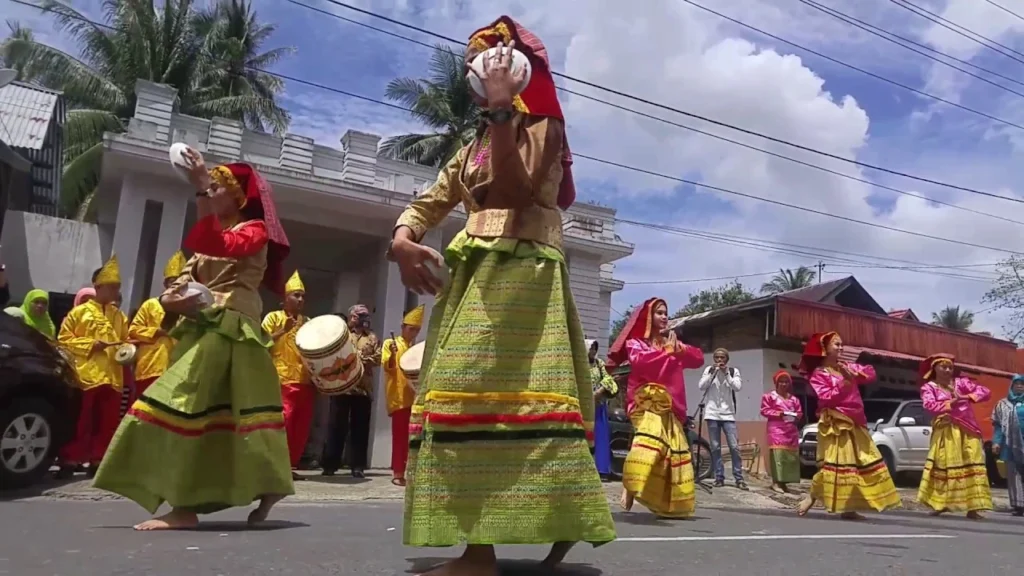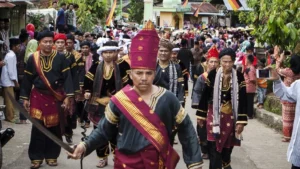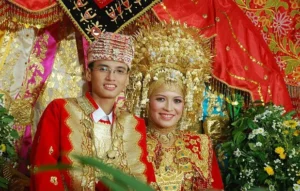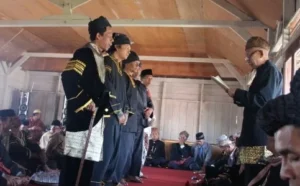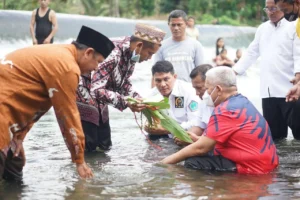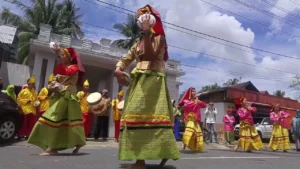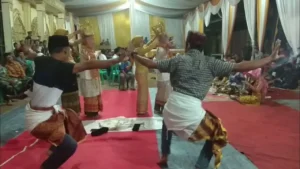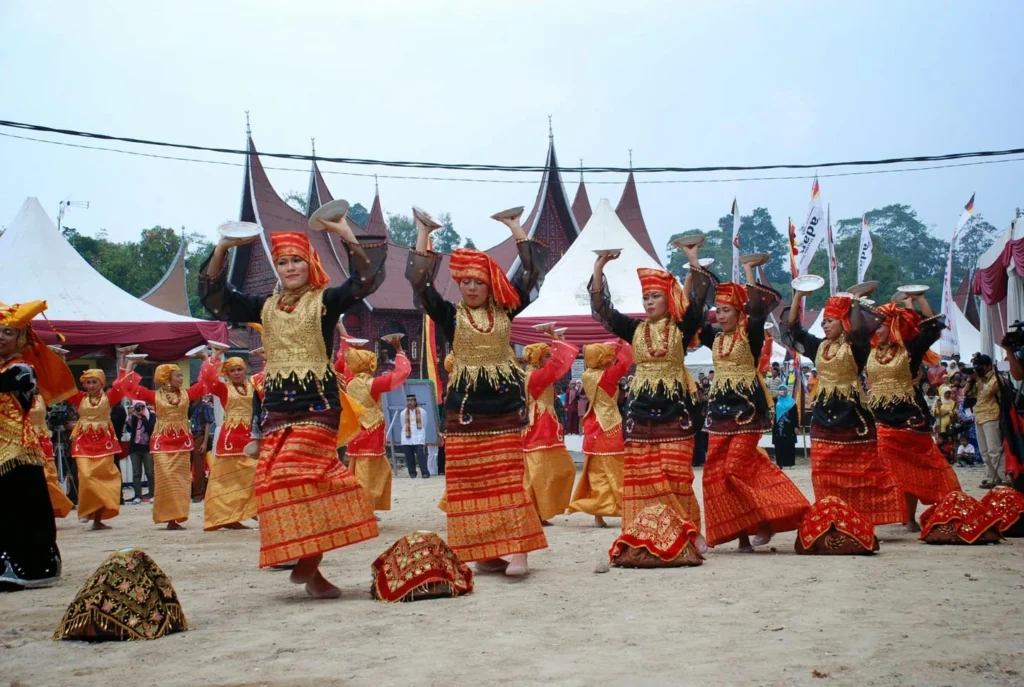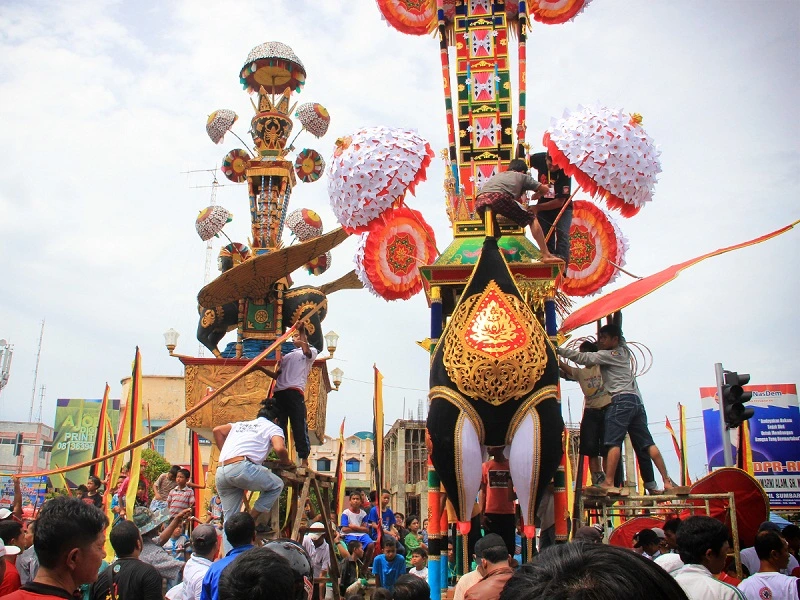West Sumatra is one of the provinces in Indonesia rich in cultural diversity and traditions. One of the most interesting cultural heritages to explore is the traditional ceremonies of West Sumatra, passed down from generation to generation. From weddings to funerals, the customs of West Sumatra have their own uniqueness that reflects the traditional values still firmly rooted in their society.
The traditional ceremonies of West Sumatra are an integral part of its population’s life. These ceremonies are a reflection of the cultural and traditional richness that has existed since time immemorial. In this article, we will review ten of the most striking and memorable traditional ceremonies of West Sumatra, as well as the importance of these ceremonies in preserving the identity and culture of the region.
10 Traditional Ceremonies of West Sumatra
1.Minangkabau Traditional Ceremony
Source : nycnews.id
The first Traditional Ceremonies of West Sumatra is the Minangkabau traditional ceremony. This ceremony plays an important role in the culture of West Sumatra society, which traditionally follows a matrilineal system. One of the most well-known traditional ceremonies is the “Penghulu Balang,” where the chief or penghulu leads an important procession involving the entire community. The Penghulu Balang plays a central role in maintaining unity and peace within the Minangkabau society.
In addition to the Penghulu Balang, the “Sambutan Adat” is also an inseparable element of every celebration or significant event in Minangkabau society. Through this traditional ceremony, the values of family and unity within cultural diversity are continuously preserved and reinforced. The Sambutan Adat reflects the hospitality and politeness of Minangkabau society while demonstrating respect for guests and loved ones.
Community involvement in these traditional ceremonies is not only as spectators but also as active participants who preserve and perpetuate traditions from generation to generation. This shows the strong influence of West Sumatra’s traditional ceremonies in preserving the identity and cultural continuity of the Minangkabau. Thus, Minangkabau traditional ceremonies are not only ceremonial events but also a concrete form of life and diversity within West Sumatra society that must be preserved for future generations.
2.Traditional Funeral Ceremony
The second Traditional Ceremonies of West Sumatra is the traditional funeral ceremony. This ceremony is an important moment charged with meaning and symbolism. The population of West Sumatra has a special tradition in preparing funerals, considered as a final tribute to the deceased. From the funeral procession to burial rituals, each step is carried out with respect and dedication. This traditional funeral ceremony is not just a series of formal actions but also a manifestation of community values and unity highly respected by the West Sumatra population.
During the traditional funeral ceremony, the family and relatives of the deceased pay their final respects by following various traditions and protocols passed down from generation to generation. In every detail, one can see the cultural richness and local wisdom inherent in the traditional ceremonies of West Sumatra. Furthermore, this traditional celebration is also a means to strengthen solidarity and unity among the community members present, as in this moment of mourning, they support and reinforce each other.
By preserving and honoring the traditions of funeral ceremonies, the population of West Sumatra pays homage to their ancestors and enriches the cultural heritage they have inherited. The traditional ceremonies of West Sumatra testify to the cultural richness and unity characteristic of the West Sumatra population.
3.Traditional Wedding Ceremony
Source : adat-tradisional.blogspot.com
The third Traditional Ceremonies of West Sumatra is the wedding ceremony. Weddings in West Sumatra are not only historic moments for the two spouses but also involve the entire family and community. The wedding ceremony here is filled with symbolism and unique traditions, ranging from marriage proposals to the wedding reception. Each step is guided by family values, solidarity, and respect for ancestors.
One of the most striking aspects of the wedding ceremony in West Sumatra is the “Adat Basandiang.” This tradition strictly governs the steps of marriage and is respected by the local population. In Adat Basandiang, there are a series of steps to be strictly followed, from the marriage proposal to the approval of both families, to the sacred wedding ceremony. Everything about the wedding is carefully organized, as a sign of respect for this sacred process.
The traditional wedding ceremony is not limited to being a celebration for the two spouses but is also a time to strengthen bonds between families and consolidate solidarity within the community. Thus, the traditional wedding ceremony is not only a formal ritual but also a manifestation of community and harmony in West Sumatra’s culture.
4.Traditional Selamatan Ceremony
The fourth Traditional Ceremonies of West Sumatra is Selamatan. This ceremony is an integral part of the life of the population of West Sumatra, rich in traditions and culture. This ceremony marks important moments in life, such as birth, marriage, or even death. Amidst the splendor of the ceremony, the focus is always on gratitude and solidarity. One of the most common selamatan ceremonies is the “Selamatan Tujuh Bulanan,” where the extended family gathers to celebrate the arrival of a new member and offer prayers and thanks. This ceremony strengthens family ties and tightens relationships among community members.
The Selamatan ceremony of West Sumatra is passed down from generation to generation and is an inseparable element of the cultural identity of West Sumatra. Selamatan is not only a formal ritual but also a manifestation of care and solidarity in common life. In every implementation, the values of local wisdom are reflected in every detail, making Selamatan a cultural heritage worthy of preservation. By maintaining and strengthening the tradition of Selamatan, the population of West Sumatra continues to consolidate its identity as a community respectful of customs and solidarity.
5.Traditional Maanta Panua Ceremony
The Maanta Panua ceremony is a unique tradition of Minangkabau society in West Sumatra. This ceremony is performed to pay homage to the deceased after a certain time following their death. Through a series of rituals, the population believes that the soul of the deceased will find peace and blessing. Each step of Maanta Panua is guided by specific customs, with the main purpose of ensuring that the process is carried out piously and in accordance with established protocols.
The Traditional Ceremonies of West Sumatra Maanta Panua is also considered a manifestation of loyalty and love towards ancestors, as well as an effort to maintain the spiritual connection between past and present generations. In the belief of Minangkabau society, maintaining a spiritual connection with ancestors is an integral part of life and the perpetuity of culture. Maanta Panua is not only a series of formal rituals but also an important moment where community values, respect, and spirituality are highly valued.
By maintaining and practicing the Maanta Panua ceremony, the population of West Sumatra ensures that their cultural heritage remains alive and relevant for future generations. This ceremony is also one of the ways for them to strengthen bonds among community members and celebrate the cultural richness they possess.
6.The traditional ceremony of Batagak Pangulu
Source: boyyendratamin.com
Batagak Pangulu is one of the traditional ceremonies of West Sumatra that is carried out to appoint or confirm a traditional leader (pangulu) within the Minangkabau community in West Sumatra. This ceremony is considered an important moment in the traditional social and political structure of the region. Batagak Pangulu is not only a process of selecting a new leader but also a manifestation of the cultural strength and solidarity rooted in Minangkabau society.
During the Batagak Pangulu procession, not only the selection of a new leader is made, but also a whole series of rituals and traditions involving the entire community. This is done in recognition and legitimization of the authority of the new leader. The active participation of the community in this Traditional Ceremonies of West Sumatra shows the strength of solidarity and unity values in Minangkabau culture.
More than just a leadership choice, Batagak Pangulu reflects the unity and strength of the Minangkabau community. Each step of this ceremony is guided by customs and traditions passed down from generation to generation. Thus, Batagak Pangulu not only strengthens the social and political structure but also preserves and celebrates the diversity and cultural richness of West Sumatra.
7.The traditional Mandi ceremony
Source: jawabansuper.github.io
Mandi Safar is one of the typical traditional ceremonies of West Sumatra within the Minangkabau community. This ceremony is an important means for them to spiritually and physically purify themselves. Usually performed in the month of Safar in the Islamic calendar, Mandi Safar is considered an effort to eliminate all kinds of illnesses and misfortunes that may threaten health and survival.
The Mandi Safar ritual is performed with devotion, accompanied by prayers and pure thoughts. The Minangkabau community believes that through Mandi Safar, they will obtain blessings and protection from God. This ceremony is not only a purification ritual but also reflects the close connection between Islam and the local culture of West Sumatra society.
In addition to being a means of purification, Mandi Safar is also an important time for the community to come together and support each other. Solidarity in performing this ceremony strengthens social ties among members of the Minangkabau community. By regularly maintaining and observing Mandi Safar, the society of West Sumatra ensures that their traditions and religious values remain preserved and relevant in everyday life.
8.The traditional Marapulai ceremony
Source: youtube.com
The next Traditional Ceremonies of West Sumatra is Marapulai. The traditional Marapulai ceremony is a joyous celebration organized by the West Sumatra community to welcome back family members or relatives who have long left their hometown. Joy and warmth surround the Marapulai process, where the entire community gathers to welcome the person’s return.
In addition to being a joyous occasion, Marapulai also has a profound significance in strengthening family ties and relationships among community members. Through this ceremony, the community celebrates not only someone’s return but also acknowledges the importance of solidarity and family support in life’s journey. The tradition of Marapulai reflects the values of solidarity and cooperation that have become an integral part of Minangkabau community culture.
By organizing this ceremony, they preserve the cultural heritage of their ancestors while also strengthening fraternal bonds among them. As one of the traditional ceremonies of West Sumatra, Marapulai is not only an important moment in family life but also an inseparable part of their identity and the continuity of their culture.
9.The traditional Maota ceremony
Maota is one of the most important traditional ceremonies of West Sumatra, especially in the context of celebrating abundant harvests or successful agricultural outcomes. The West Sumatra community greatly values the products of their agriculture as a gift from God to be thankful for and celebrated together. During the Maota ceremony, all community members gather to participate in a series of ritual activities loaded with religious and cultural significance.
This Traditional Ceremonies of West Sumatra is not only a celebration but also an expression of gratitude for abundant harvests. Participants in Maota present a variety of traditional dishes as symbols of agricultural abundance. They also follow various rituals and traditions passed down from generation to generation, as a sign of respect for ancestors and gratitude for God’s gifts.
By organizing the Maota ceremony, the West Sumatra community celebrates not only the success of their agriculture but also strengthens social ties and solidarity among community members. This ritual is a moment that unites the community in gratitude and solidarity. As an integral part of the traditional ceremonies of West Sumatra, Maota helps preserve the rich cultural heritage and values that are meaningful and valuable.
10.The traditional Sungkai ceremony
Source: youtube.com
Sungkai is an important practice in West Sumatra society, serving as a form of respect and tribute to the elderly or important figures in the community. This ceremony is not only ceremonial but is also experienced with warmth and conviviality.
During Sungkai, all members of society gather to pay homage to the honored person. They express their gratitude and respect for the contributions and life experience of this individual. Sungkai is also a time to celebrate the wisdom and knowledge shared by this figure with the community.
Furthermore, Sungkai is also an opportunity to reconnect social ties and solidarity among community members. Through the joy and warmth emanating from Sungkai, relationships among society members are strengthened. This Traditional Ceremonies of West Sumatra not only commemorates wisdom and old age but also serves to appreciate and celebrate the diversity and cultural richness of West Sumatra society. Sungkai is one of the manifestations of local wisdom and traditions passed down from generation to generation, preserved and perpetuated by future generations.
Conclusion
The traditional ceremonies of West Sumatra are not just a series of mechanically executed rituals but are also a manifestation of the life and beliefs of the local population. In every detail, these ceremonies reflect the cultural richness passed down from generation to generation, highlighting the integrity and diversity that characterize this region. The traditional ceremonies of West Sumatra demonstrate a deep respect for ancestors and traditions that have shaped the identity of their society. These practices are also pillars of solidarity, uniting individuals into a greater entity and nurturing a sense of unity among them.
The traditional ceremonies of West Sumatra are not just spectacles but also represent the values cherished by their community. By preserving and perpetuating these Traditional Ceremonies of West Sumatra, West Sumatra society indirectly maintains and strengthens its cultural identity. Through these ceremonies, younger generations are encouraged to appreciate the history and traditions of their ancestors and understand the importance of preserving their cultural heritage.
Thus, the traditional ceremonies of West Sumatra are not just a rich cultural heritage but also an integral part of the life of the local community. Through these practices, the values of solidarity, unity, and respect for traditions are continually preserved and reinforced from generation to generation. Plan your trip to West Sumatra now to discover the richness of the traditional ceremonies of West Sumatra. Don’t forget to contact us; we are ready to help and accompany you on your journey to the island of Sumatra.

